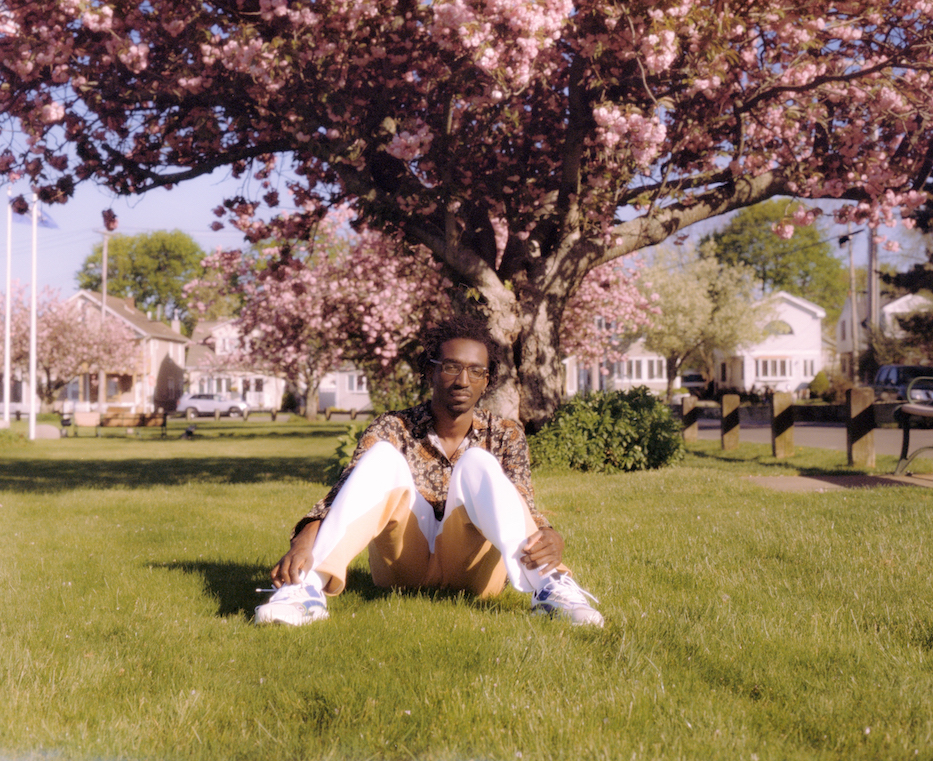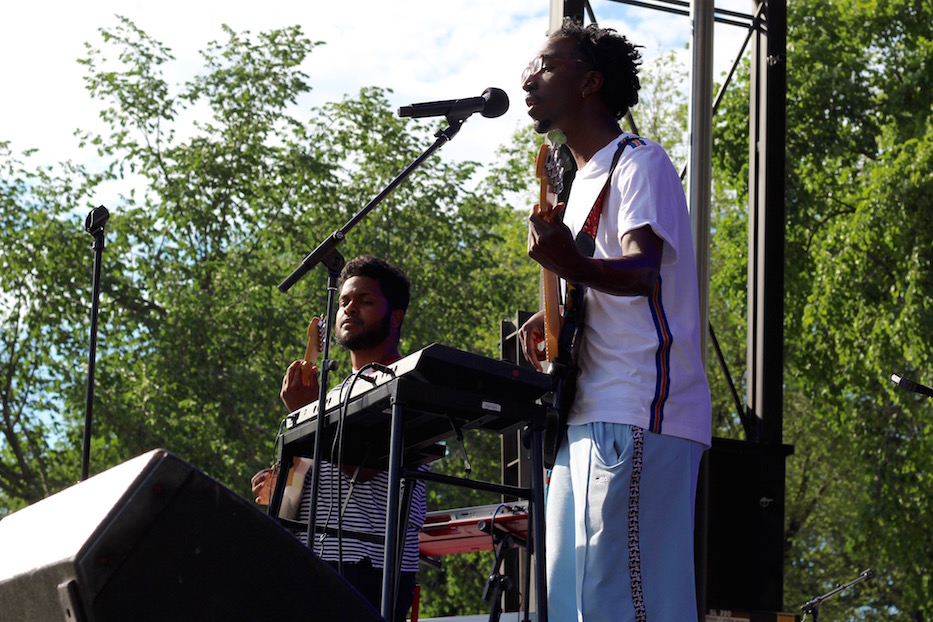

| Photo Courtesy Trey Moore. |
The beat is pumping as soon as “In My Mind” gets going. Drums and synth fuse to form a heartbeat—or maybe it's multiple heartbeats—with guitar woven tightly in between them. There’s a bouncy castle somewhere in there, soaked with sunshine and summer heat, a soda stain running down its side. Trey Moore comes in on vocals, and everything is an instant earworm. Smooth with a touch of disco, funk and glitter at the edges.
“In My Mind” is one of five tracks on Summer Solstice, a sun-soaked, delicious and surprising release from 25-year-old musician Trey Moore (true to its name, Moore dropped it on the summer solstice). The latest since his electric, bouncy and soulful “Sunset Demo” two months ago, the EP digs deep on Moore’s burgeoning experience in production and self-taught musicianship, while wading into new territory. It’s fun, with a sharp and polished edge.
“The new stuff is more detailed,” he said of the release in a recent interview downtown. “I’m not sure how people perceive my music, but to me it feels more polished sonically. Better mixes, and a more uniform rollout. It’s centered around the summer and the season.”
For Moore, the EP marks the latest chapter in a life of musical experiment. Born and raised in New Haven, the artist grew up “kind of everywhere” around the city, hopping from neighborhood to neighborhood with a detour in North Carolina during his high school years.
Long before school became a musical training ground, he received impromptu lessons at home and at church, where his mom was a gospel singer and his dad was a professional bassist. As a young kid, Moore was bathed in gospel during weekly services at Turner’s Faith Temple, now called Cathedral of Faith, in Bridgeport. Much later, during his sophomore year of college, he returned to those roots to play at another Bridgeport church called Kingdom Builders Impact Ministries. He still plays there today.
It became apparent fairly early that music was in his blood, he said. Before he was born, both of his parents spent time touring as professional musicians, meaning that the house was never not full of sound. When he was six, they gifted him a starter Yamaha keyboard for his birthday. It marked the beginning of a self-taught career that has stretched into his latest releases.

| Trey Moore performs on the International Festival of Arts & Ideas main stage in mid-June 2019. Lucy Gellman Photo. |
“It was always in the house, and I took an interest in it,” he said. “I just started learning how to play these simple songs. My dad, seeing I was interested in music seriously, he started to pull me to the side and play me different artists.”
Soon, Moore’s young head was on fire with the music of Price, George Clinton and Parliament Funkadelic, Chick Corea, Thelonious Monk and John Coltrane. He started to teach himself, first with the goal of mastering the piano, and then adding the drums, bass, guitar, trumpet and ultimately vocals to his wheelhouse. He dug into the craft in the classroom as a student at Betsy Ross Arts Magnet School and then at Cooperative Arts & Humanities High School for a year, holding onto those Co-Op friends even after he transferred to Hill Regional Career High School. In late high school, they formed a group called “Blue Mood,” configurations of which still play in New Haven (musician Paul Bryant Hudson, who is a close friend of his, was one member).
Somewhere in between, he started interning at Horizon Studios in West Haven, where his parents recorded their music. It was his gateway to production: Horizon owner Vic Steffens took Moore under his wing, opened the studio door, and gave him the space to experiment.
“He just threw me into a studio and let me figure it out,” he recalled. “He couldn’t be bothered with this young kid in the basement, asking him questions. That’s when I first began to experiment with my own sounds and learn how to make music and put things together. It was cool, just to be around all the different equipment.”
“Probably one of the biggest hurdles for young musicians and aspiring producers is having gear and having things accessible to them,” he continued. “There are a lot of kids with the talent, or young adults like me, who just want to do it but don’t know where to start. They don’t have access to studios or access to spaces that act as an incubator, to allow them to grow and explore their gifts.”
As a teenager, he started to release music in fits and starts, trying to find his sound as he started school at Maine’s Hudson University and then at Southern Connecticut State University. During those years, Moore was running track for SCSU, and could feel it pulling him away from his music. So he left—first the team, and then the school—and decided to dedicate himself entirely to his craft. While he's still navigating what that means with two part-time jobs, he said that he’s excited to be dedicating so much of himself to his art.
“It’s the best thing I’ve ever done,” he said. “I think the time we have here on earth, how we spend that time and how it affects us mentally and creatively is really important. I think it’s important for us to pay attention to that.”
“I try to place emphasis on the art and the creativity while recognizing that for me, it doesn’t take much financially for me to be successful,” he added. “If I can just have the things I need, and if music can provide that, which it has to this point, it can be sustainable.”
In the years since, he has continued to teach himself entirely from YouTube videos, sounding music out by ear and experimenting with compositions. Some of those make it to full production; others never see the light of day. For a while, he didn’t own a keyboard, and felt held back by thinking about sounds that he wanted to make, but didn’t have the right gear for. Then someone gave him a piano.
He also invested in a laptop several years ago, suddenly able to experiment with Fruity Loops Studio and ProTools because he knew the program from his time at Horizon. In addition to the sounds he had grown up with, he added new names to the mix, including Pharell and early Ryan Leslie. He started teaching himself about filmmaking, a craft that he is still honing for his own videos.
As he has continued to make music, Moore said he’s still hyper-aware of a segregated city, where both young and professional artists of color aren’t granted access to the same programs and opportunities as their wealthier, often whiter peers. He said he’d like to see more collaboration between local artists and city festivals, which often bring in out-of-town artists. He lauded a shift that he’s seeing at programs including the International Festival of Arts & Ideas, where he played on the main stage earlier this month as part of a local lineup curated by local artists. Still, he said, he’d like to see more of it.
“The knowledge I gained didn’t come from anything here,” he said. “We didn’t really feel invited to do a lot of things, and even now there’s definitely a divide artistically. And the way we’ve responded to that is we create our own venues. We create our own atmospheres. We create our own networks. And we grow. We do a lot underground, a lot of which is more impactful than a lot of the visible things that you might see.”
Summer Solstice is the latest outgrowth of those networks, and asserts itself with equal parts buoyancy, chill, rhythm and grace. From the moment Moore comes in with “In My Mind,” there’s a feel that’s both clubby and comfortable, as if listeners can crawl into it while still doing a little shoulder shrugging. They are literally transported to Moore’s mind—he gives them a peek into his own thought process with a series of echoey rhetorical questions that are looped like a mantra.
It’s a propulsion that keeps one coming back, with some tracks ("Orion") that are worthy of hours of repeat. All five tracks are best with multiple listens, as Moore peels sonic layers away and it becomes difficult not to dance along. There’s an earwormy gem of a beat on “San Junipero,” a delicious and fuzzy electric thread that weaves through “Orion,” a crooning earnestness on “Orange” that makes one want to cut out of work early and hit Lighthouse Point with a friend.
His vocals are a delight: they sail and swoop, lift and then bend just when they’re starting to get predictable—which is almost never. It’s fitting that the final track is titled “Searching,” because it leaves the listener searching desperately for more.
“I think my sound is a lot more consistent now,” Moore said. “When I was younger, I was just exploring a lot. I was pretty much working from one keyboard, and everything was really mono. Now everything is more open and consistent. My mixes are a little better. When you hear my songs, you kind of know it’s me now.”
“I’m always trying to get better,” he added. “I’m still learning how to do that in the best way for myself.”

